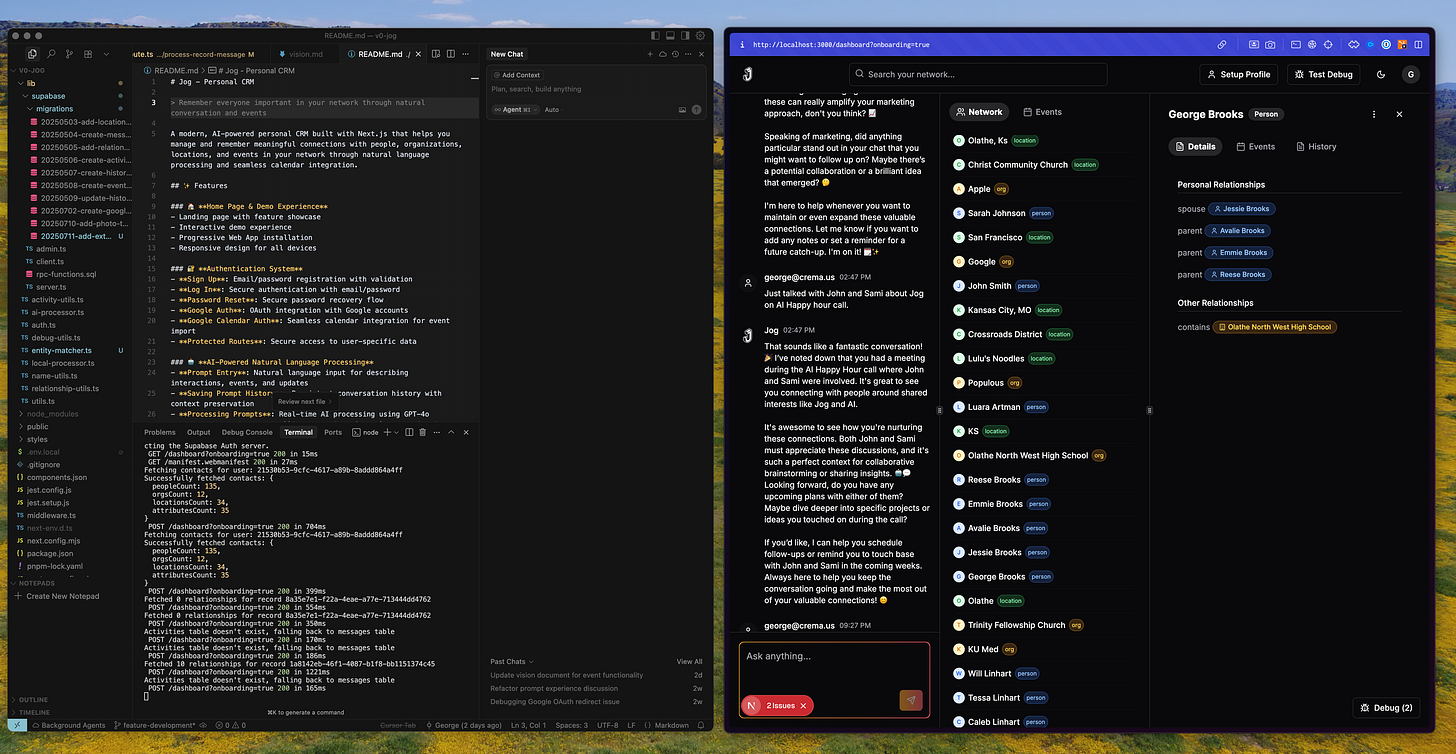Strategic senior developers are not going away any time soon.
Why a more senior, strategic developer is even more valuable in the age of AI.
The narrative more recently is that AI will replace all developers, perhaps later this year or maybe next.
Here's why I don't believe that to be true from first-hand experience. Not just headlines. And this is coming from a CEO who is NOT a developer, so I’m not just defending my skillset.
Most non-technical CEOs only brag about the promise of AI. But I’m trying to explain where I see the real-world edges.
This is not an anti-AI post. I’m generally very pro-AI and excited about the potential future. I’m seeing the hybrid reality of where we are today and where things are headed.
Vibe coding enterprise products doesn't fully exist… yet.
From first-hand experience of vibe-coding my app (not tapping the shoulders of the Crema in-house team), just to see how far I can get on my own, progress wasn’t great. This is despite having 16 years of product/UX experience. I know the jargon, vocabulary, and basics, but not the pros and cons of architectural decisions, migration workflows, deployment approaches, etc.
Our senior developers can run laps around me in this type of work. I can't get vibe-coding to achieve the desired outcome without significant hours of testing, learning, and iterations. Far beyond the time I should be spending here.
Does that mean I'll stop? No! I'm learning where the edges are and sharing internally and externally. Also, it's fun!
So why the layoffs?
As much as all of the big tech companies are talking about massive layoffs and replacing half their workforce with AI, I would suggest that this is actually these organizations finally shedding a vanity metric of talent hoarding. Armies of individuals who waste hours deciding what color and position a button will have to squeeze out a small % KPI shift in a giant user base. Helpful? Yes.
Do you need 300 people onboarding every 2 weeks to accomplish this? No.
Yes, AI has to do with it. It’s forcing companies to ask the questions, “Do I need all these people to achieve our goals? And if I don’t… who can achieve more with less?”
Is AI being used?
Absolutely.
Product planning
Bug fixing
Testing
Code-assisting
Code drafting
etc.
But the question is… by whom?
There are tons of enterprise vibe coding tools on the market, right?
Yes. Yes, there are. Microsoft Co-pilot and Power Apps, Google Gemini, and a dozen more. All with the promise of designing, building, and deploying an enterprise product with quality, security, and scale.
But working first-hand with enterprises, they are testing, and they are prototyping, but they are not deploying fully AI-generated and managed apps without senior technical oversight and support.
Those getting the best results have strategic senior technical talent either orchestrating the entire experience, leveraging AI’s capabilities, or overseeing the entire end-to-end solution.
Though I would argue that the lion's share of the products hitting the market are aimed at small tech ventures or ‘solopreneurs.’ High volume, lower risk.
Security is a BIG concern for enterprises
Cybersecurity incidents are likely one of the largest threats to any technical organization, outside of macroeconomic shifts, and labor shortages. A breach or security incident can break trust with employees, clients, investors, stakeholders, and more.

Now, I would argue that to overcompensate for this, security leadership's answer to this is often to say "no" to everything. Yet, we are seeing a shift here. Many of our enterprise clients are a mix. Some are moving full steam ahead and building protocols as they build and fly the plane, and some are throttling way back and waiting for the dust to settle, but falling behind because of it. Is there a right answer? No, both have to happen. Close eyes on innovation, scale, security, and evolution.
Not exclusively, but this seems to align pretty closely with those enterprises that are tech-forward in their views of cloud computing, in-house innovation, development, and strategic investment in early venture partnerships.
The AI is not always right
While the LLM-generated code can achieve some pretty extraordinary results, it will often look for either the most popular way to do something (via its internet-trained context) or the most complex way of doing something (via its internet-trained context), and there may be a better way.
Multiple times in my vibe-coding, I found myself going in circles and not achieving the results I was hoping for, though they were inside and simple enough. It wasn’t until I suggested a more basic approach, or even went and did my own research to provide a suggestion, that the LLM finally decided it worth considering.
Why doesn't it do this well? Almost always, it’s about context. The LLM has absolutely no idea what is going on outside the code base. I am sure that if it had the context, it might be able to do it, but without this context, it’s functionally looking to achieve what it thinks you want.
A strategic developer has context
A senior strategic developer, on the other hand, not only has experience and a technical approach that he or she considers best practice, but more importantly, has real-world context.
They know that…
In a few weeks, there might be talks of integrating a new data source. Then the current approach will have to change.
There is a legal constraint on how often we can fetch data from that 3rd party API.
There is a business desire to turn this in-house tool into a multi-tenant SaaS product one day.
The employee users have been using the same spreadsheet for 5 years, and don’t actually want this software yet.
The company doesn’t have any customers yet, so they need to get to revenue sooner rather than later.
They just acquired their competitor, and in 3 months, they are going to integrate 2 companies’ data into one solution.
They know that the guy who wrote the original app is very proud of his work, even though it’s built on libraries that were sunset 5 years ago.
LLMs binge on context to get the best results. It might seem like magic at first, but they are desperately scrounging for memories to shape around a user and their context. But feeding, training, and tuning all this context is a technical beat and feat in and of itself.
So what?
So… bring your strategic developers to the table and keep testing AI!
Listen to devs concerns.
Challenge their challenges.
Name the desired outcomes.
Equip them with best-in-class tools.
Test and test again. The tools will get better, make sure you’re people do too.
A conversation for another day
So what about junior talent?
Need help with that product and strategic oversight with your in-house innovation?
Schedule a time to talk with me about a product team assessment.
https://calendly.com/crema-george/product-team-assessment
Thanks ya’ll!
-George







